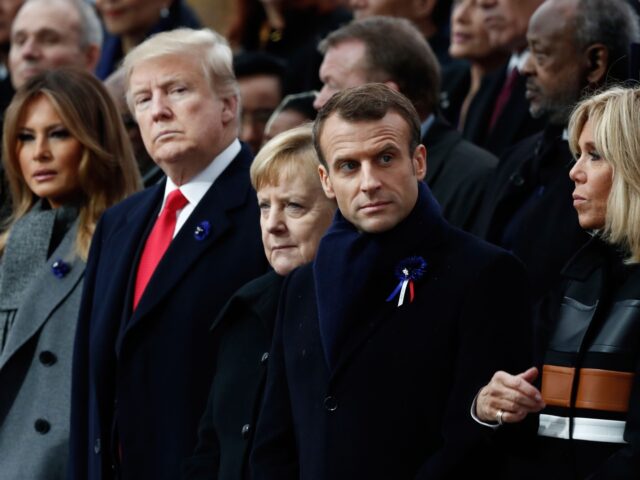2024: The Year Trumpism Triumphed and Put Globalists on the Run in Europe
As Brexit foreshadowed Donald Trump’s victory in
2016, the defeat of Kamala Harris and the Democrats this year was
preceded by the fall of globalists in Europe, as Trumpism and the
populist message began to erode power structures across the Atlantic. Listen To Story
Upon entering office in 2016, Trump was not only faced with opposition at home, in the form of Democrats, the ‘Russiagate’ conspiracy-purveying deep state, and neo-cons and other opponents in his own party, but also by leaders in Europe with firm power bases that enabled them to push back against the aims of the first Trump administration.
Now, eight years later, as Trump prepares to take back the reigns of power in Washington and the domestic opposition in disarray, those who would seek to thwart his vision for the world in capitals like Berlin, Brussels, London, or Paris have largely either fallen by the wayside or have been brought low by fleeting legitimacy in their homelands and abroad.
Meanwhile, Trumpism appears to be catching on in Europe, with key figures in the international populist movement making major gains this year and in some cases entering into government in countries where it would have been unthinkable even just a few years ago.
Although the world has broken out into chaos in Trump’s absence, with wars erupting in both Europe and the Middle East, in many respects the global chessboard appears much more favourable to the MAGA position. Here’s a look at some of the key areas of the board and the pieces left standing:
The Sun Setting on Jupiter
The only major European power player during Trump’s first term in office to still be in office is French President Emmanuel Macron, which perhaps played a part in Trump’s decision to make Paris the destination of his first international visit after his election victory.
Initially hailed as a “bromance” before later being downgraded by the press to “frenemies”, the relationship between the two leaders has always, in reality, been rocky at best, given their fundamentally opposed world views. Macron prefers a globalist perspective, in which he, as a ‘Jupitarean’ figure, rises above mere France as a leader of Europe willing to sacrifice national interest for the greater internationalist project, while Trump places an emphasis on putting his own country above all others.
Emmanuel Bonaparte: Macron Declares He Will Govern Like a Roman God https://t.co/IQpkKgSIZs
— Breitbart London (@BreitbartLondon) July 4, 2017
The relationship between the two men has been best symbolised by their now years-long battle during handshakes. Gritted teeth masquerading as smiles, the pair have squared off numerous times during photo-ops, with some handshakes lasting minutes as they jockeyed for position.
In their back and forth handshake battles, Trump mostly came out on top over the comparatively diminutive Macron. This result has often been mirrored in other disputes between the two leaders, with Trump often delighting in relaying how he forced Macron into accepting better trade terms after threatening to slap large tariffs on French wine imports to the United States.
Today, Macron is in a somewhat contradictory position of being both one of the most seasoned politicians in Europe and simultaneously in his weakest position since coming to power in 2017. Domestic politics in France has descended into a potentially perilous stalemate after his disastrous decision to call for snap legislative elections in June after suffering an embarrassing defeat to Marine Le Pen’s National Rally in the preceding EU elections.
BREAKING: President Trump just met up with French President Emmanuel Macron pic.twitter.com/Ffs6mHo4Jv
— George (@BehizyTweets) December 7, 2024
During the second round of the legislative elections, often used to keep outsider parties from taking power Macron, fearful of another victory for Le Pen, partnered with the leftist New Popular Front coalition. Though the right was thwarted, it left the National Assembly in an apparently ungovernable three-way split.
This came at a particularly inopportune moment, given France’s growing debt crisis, which risks the country downgraded by credit agencies and even financially sanctioned by the EU. This position of economic weakness bodes poorly for Paris if it attempts to engage in a trade war with Trump, whose economy is on much firmer footing.
Macron is now on his fourth government of the year, after short-term Michel Barnier became the first prime minister to be ousted by the National Assembly since 1962 after he tried to force through tax hikes and cuts to social security, which critics on the left and right blasted as displacing the failures of the Macron administration onto the public. With Macron prohibited from calling for new parliamentary elections until June, it is possible that he may be forced to resign if another one of his governments fails to pass a budget and collapses.
🇺🇸🇫🇷TRUMP REVEALS HOW HE STOPPED FRANCE'S TAX ON U.S COMPANIES
— Mario Nawfal (@MarioNawfal) May 12, 2024
"Emmanuel, you're putting a big tax on American companies doing business in France. You can't do it.
Oh, it's too late. I wish you would have called me earlier. It's too late.
I said, let me just tell you… pic.twitter.com/ORS2ypA0BF
Read More Here: Breitbart





